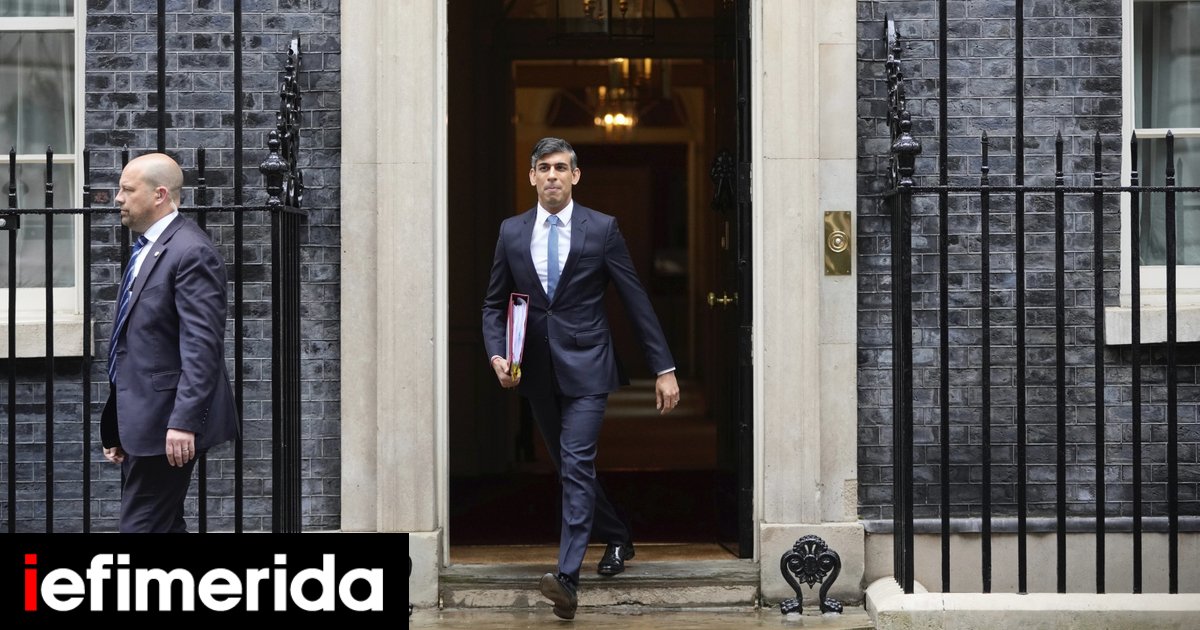
Rishi Sunak’s surprise decision to call a 4th of July election in Britain is being interpreted by British and international media as a high-risk move.
All this with the Conservative Party down nearly 20% in the polls and Sir Keir Starmer will attempt to return Labor to power after 14 consecutive years of Conservative governments.
Addressing Britons outside Downing Street in the rain, Sunak said “it is time for Britain to choose its future”, arguing that voters could trust the Conservatives to lead the country at a time of global instability, despite the Labor anthem during his speech “Dr. ” :Ream: Things Can Only Get Better, played by Brexiteer Steve Bray.
Sunak’s speech has alarmed senior figures in the Conservative Party who fear the ruling party will collapse in the elections, with some MPs, according to The Guardian, considering the possibility of submitting letters of no confidence against the Prime Minister.
Why did Sunak choose the election in July?
Sunak and his colleagues chose the element of surprise at a time when, after so much bad news from Downing Street in recent months, some light is beginning to shine through the fiscal tunnel, as he explained in a video on Platform “. If he waits to postpone the election, things could get worse, says Politico, trying to explain the British Prime Minister’s motives.
Sunak will fight a tough election battle over the next month and a half believing the economy will do better, while Sir Keir Starmer will insist a Labor government has the country in its worst economic position since World War II.
Britain: In a video, Rishi Sunak explains why he called for an election on the Fourth of July
Sunak met King Charles before the election was announced – royal duties postponed
Sunak risked holding the election in July, when many in the Conservative Party still believed they had months to prepare. But the battle ahead remains the same regardless of the timeline: the path of growth and living standards versus where the economy is now.
Improving the condition of the British economy
Headwinds have begun to blow in the sails of the British economy with the end of last year’s mild recession and GDP growth and inflation around the 2% target set by the Bank of England.
For voters, unemployment is low, wages have outpaced inflation for 10 months, and workers are feeling the benefit of £20bn of tax cuts. Sunak said on Wednesday that inflation was “back to normal” and that “brighter days lie ahead.”
Labour’s arguments
Labor responded to Sunak, saying that although real wages are rising, they remain lower than they were before the financial crisis, meaning purchasing power is lower than they were in 2007. Prices in Britain are almost 25% higher than they were before. Coronavirus pandemic, and per capita GDP is low. 0.7% lower than last year.
Britain: MP who lost arms and legs to septic shock returned to duties – deified [βίντεο]
Early elections in Britain: Sunak announced that the elections would be held on July 4
Moreover, for a Conservative Party that used to attack Labor on taxes, the tax burden is heading towards its highest level in 70 years. Last week, Sunak’s finance minister, Jeremy Hunt, admitted that living standards had fallen since the last election in 2019, when Boris Johnson triumphed by promising to complete Brexit and Brexit. “The Conservatives are trying to build momentum on this latest economic data,” said Kate Dummett, professor of digital policy at the University of Sheffield. “But it will be a real challenge for them,” he added.
“do not touch…”
The challenge for the Labor Party is to turn its long period of dominance at the ballot box and its victories in local and municipal elections in recent years into an electoral victory. Defeat in the last general election in 2019 under Jeremy Corbyn means Starmer will need the biggest electoral party shift of the post-war era to come to power.
However, despite a 20% rise in opinion polls, Starmer sees his popularity even lower than that of Ed Miliband nine years ago, and according to poll analysis, there are fewer voters today than ten years ago who consider the official opposition to have Competent staff who understand the country’s problems.
Ipsos chief Ben Page told the Guardian: “It disgusts the Tories more than it pleases Labour, which leads the political scene.”
The British newspaper indicates that Starmer, although he pledged when he took over the reins of the Labor Party four years ago to follow in Corbyn’s footsteps, over time he changed his plan, as did the leadership team. Although some of his decisions alienated traditional Labor Party voters, their percentages today exceed 40%.
Workers’ struggle for self-reliance in elections
As Sky News estimates, Labor will need a margin of more than 8.3% over Sunak’s Conservatives to break the deadlock first, as well as a 12.5% lead to ensure even marginal self-reliance.
But after the party switch, some pollsters believe Labor can flatten the Conservatives and take power in as many as 400 seats, which would represent a landslide electoral victory compared to the last election, when Johnson’s Conservatives secured an 80-seat majority in parliament.

“Hipster-friendly coffee fanatic. Subtly charming bacon advocate. Friend of animals everywhere.”





More Stories
F-16 crashes in Ukraine – pilot dies due to his own error
Namibia plans to kill more than 700 wild animals to feed starving population
Endurance test for EU-Turkey relations and Ankara with Greece and Cyprus